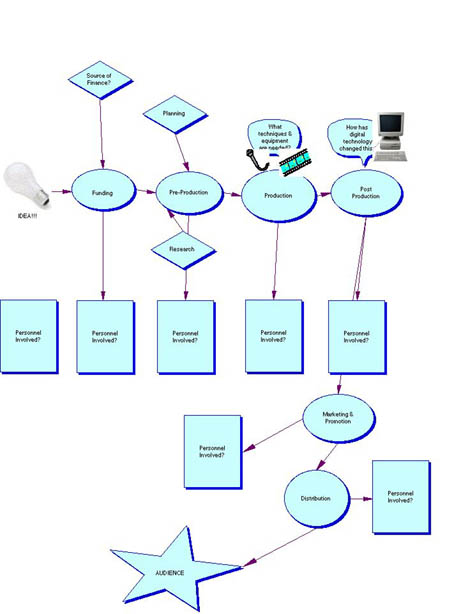

The production of media texts is a complex and expensive process, involving the creative input of many specially skilled people.
Anyone can produce a media text, if they have a bit of time, an idea, and access to a computer
We live in a world where both the above statements are true. There are many different forms of the media, and the means of production, which one used to be exclusively held by big companies, like movie studios or tv stations, are now within the reach of many. However, this does not mean that the basic media production process has changed. Media texts, whether they are being produced by Time-Warner or a teenager, go through the same stages before they reach an audience. This is what we call the production process.

Every media text begins with someone having an idea. They may be a professional song or scriptwriter who is able to package their ideas into a readily saleable form. Or they may be someone who dreams of producing their own movie. Or they may be a publishing executive who wants to launch a new magazine. Whatever. Someone, somewhere has to start with an idea. Once you have an idea, in order to make it into reality, you need $$$.
Some media texts are very cheap to produce. Others take millions upon millions of dollars. However, it doesn't matter how much money you need for your media text, it has to come from somewhere. Ideas will be submitted to potential financiers in the form of a proposal. This means that they have a clear idea of what the media text will consist of (a synopsis of the story, a demo tape of songs, character drawings for a comic) and that they also have a clear idea of who the target audience are. Those wishing to retain control of all subsequent parts of the process themselves will take their proposal to independent investors. Investors may want little or no say in what happens during production - they just want a return on their money at the end of the day. Those who don't just want money for their idea, but additional expertise, experience and equipment, will take their proposal to a media production company. The production company will take on the idea, and provide the means for its realisation, whether it is a pop CD or a computer game. often money will come from several different sources.
This is a vital part of the process, and often the lengthiest. Research needs to be done into audience, and the idea fine-tuned to meet demand. Existing media texts that are similar in form or content are carefully examined. Each stage of production must be planned, with equipment, locations and personnel booked in advance. Organisation is vital
This is often the most straightforward part of production, and involves creating the raw data (text, images, sound) that will constitute the final product.
This mainly consists of editing, constructing the raw data into the form that the audience will receive. It is during this part of the process that special effects and soundtracks are added to films, where pop records are mixed, and where magazine pages are laid out and proof read. This often used to be the most expensive part of the process, with heavily specialised equipment and personnel being required. However, the digital revolution means that much of this can now be done on a PC. Skilled operators and specialist software are still required, and there are huge post-production companies dedicated to providing these services.
Once the text has been created (although these days, particularly in the film industry, marketing and promotion can begin as soon as the main personnel have agreed to do the project) audiences need to be informed about it. This can also be an expensive part of the process (marketing budgets for movies can equal 100% of the production costs. This is therefore around $50M USD for an average Hollywood picture).
Once an audience know about a media text, they need to get hold of it. Distribution is big business, and is about shipping products rather than creating them. Therefore, media production companies often sell the rights to their text to specialist distributors at this stage, eg HMV will take on all record companies' CDs, rather than them trying to open up record stores themselves. However, the distributor and the production company may be part of the same media conglomerate, so all the profit eventually ends up in the same place. There are many different channels of distribution - CDs can be sold via shops, the internet or telesales, movies can be watched at the cinema, bought on DVD or video, viewed on tv and both CDs and TVs can be downloaded onto your phone or computer.